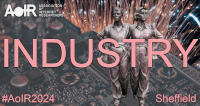PODCASTING, VR, AI AND THE EVOLUTION OF INTIMACY
DOI:
https://doi.org/10.5210/spir.v2024i0.13970Palabras clave:
podcasting, intimacy, VR, AI, metaverseResumen
Using radio and podcast studies as its main scholarship areas, this paper will examine the potential for Virtual Reality (VR) and Artificial Intelligence (AI) technologies to change podcasting both in how it is crafted and in how audiences consume podcasts. Focusing on the idea of intimacy this paper interrogates how this defining characteristic of “sound-based digital media” (Hilmes, 2013:44) may persist and evolve, particularly through conceptualizations of space and place, imagined and actual. In a landscape where podcasting is increasingly perceived by (mostly younger) audiences and creators to be a visual medium (Berry, 2023), I want to explore how intimacy may continue to be a defining characteristic of podcasting. In particular, and going well beyond just the aural or indeed beyond the combination of the visual and the aural, I want to understand what intimacy can mean when podcasting moves into the virtual reality immersive space. This paper’s case study is the video version of episode 398 of the Lex Fridman Podcast, which is an interview with Facebook and Meta’s co-founder and CEO Mark Zuckerberg, titled 'First Interview in the Metaverse'. In the podcast, the two meet in the metaverse to discuss the new possibilities that this technology, in combination with AI, may open in the ways that humans communicate with each other through the internet. Looking at themes such as disembodiment, imagination and materiality, this paper examines what VR and AI technologies can mean for podcasting and the way audiences and podcasters may communicate and create meaning through them.Descargas
Publicado
2025-01-02
Cómo citar
Karathanasopoulou, . E. (2025). PODCASTING, VR, AI AND THE EVOLUTION OF INTIMACY. AoIR Selected Papers of Internet Research. https://doi.org/10.5210/spir.v2024i0.13970
Número
Sección
Papers K

